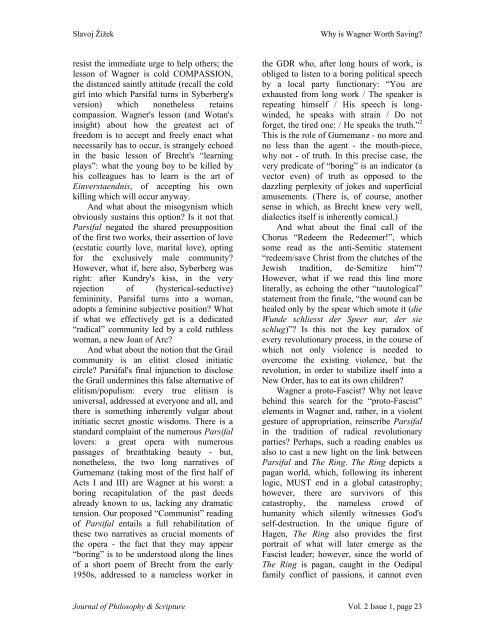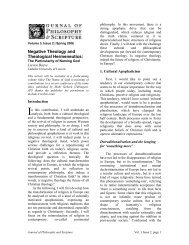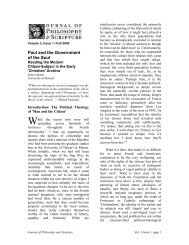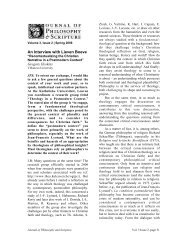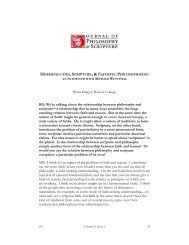Why is Wagner Worth Saving? Slavoj Žižek - Journal of Philosophy ...
Why is Wagner Worth Saving? Slavoj Žižek - Journal of Philosophy ...
Why is Wagner Worth Saving? Slavoj Žižek - Journal of Philosophy ...
Create successful ePaper yourself
Turn your PDF publications into a flip-book with our unique Google optimized e-Paper software.
<strong>Slavoj</strong> Žižek<br />
<strong>Why</strong> <strong>is</strong> <strong>Wagner</strong> <strong>Worth</strong> <strong>Saving</strong>?<br />
res<strong>is</strong>t the immediate urge to help others; the<br />
lesson <strong>of</strong> <strong>Wagner</strong> <strong>is</strong> cold COMPASSION,<br />
the d<strong>is</strong>tanced saintly attitude (recall the cold<br />
girl into which Parsifal turns in Syberberg's<br />
version) which nonetheless retains<br />
compassion. <strong>Wagner</strong>'s lesson (and Wotan's<br />
insight) about how the greatest act <strong>of</strong><br />
freedom <strong>is</strong> to accept and freely enact what<br />
necessarily has to occur, <strong>is</strong> strangely echoed<br />
in the basic lesson <strong>of</strong> Brecht's “learning<br />
plays”: what the young boy to be killed by<br />
h<strong>is</strong> colleagues has to learn <strong>is</strong> the art <strong>of</strong><br />
Einverstaendn<strong>is</strong>, <strong>of</strong> accepting h<strong>is</strong> own<br />
killing which will occur anyway.<br />
And what about the m<strong>is</strong>ogyn<strong>is</strong>m which<br />
obviously sustains th<strong>is</strong> option? Is it not that<br />
Parsifal negated the shared presupposition<br />
<strong>of</strong> the first two works, their assertion <strong>of</strong> love<br />
(ecstatic courtly love, marital love), opting<br />
for the exclusively male community?<br />
However, what if, here also, Syberberg was<br />
right: after Kundry's k<strong>is</strong>s, in the very<br />
rejection <strong>of</strong> (hysterical-seductive)<br />
femininity, Parsifal turns into a woman,<br />
adopts a feminine subjective position? What<br />
if what we effectively get <strong>is</strong> a dedicated<br />
“radical” community led by a cold ruthless<br />
woman, a new Joan <strong>of</strong> Arc?<br />
And what about the notion that the Grail<br />
community <strong>is</strong> an elit<strong>is</strong>t closed initiatic<br />
circle? Parsifal's final injunction to d<strong>is</strong>close<br />
the Grail undermines th<strong>is</strong> false alternative <strong>of</strong><br />
elit<strong>is</strong>m/popul<strong>is</strong>m: every true elit<strong>is</strong>m <strong>is</strong><br />
universal, addressed at everyone and all, and<br />
there <strong>is</strong> something inherently vulgar about<br />
initiatic secret gnostic w<strong>is</strong>doms. There <strong>is</strong> a<br />
standard complaint <strong>of</strong> the numerous Parsifal<br />
lovers: a great opera with numerous<br />
passages <strong>of</strong> breathtaking beauty - but,<br />
nonetheless, the two long narratives <strong>of</strong><br />
Gurnemanz (taking most <strong>of</strong> the first half <strong>of</strong><br />
Acts I and III) are <strong>Wagner</strong> at h<strong>is</strong> worst: a<br />
boring recapitulation <strong>of</strong> the past deeds<br />
already known to us, lacking any dramatic<br />
tension. Our proposed “Commun<strong>is</strong>t” reading<br />
<strong>of</strong> Parsifal entails a full rehabilitation <strong>of</strong><br />
these two narratives as crucial moments <strong>of</strong><br />
the opera - the fact that they may appear<br />
“boring” <strong>is</strong> to be understood along the lines<br />
<strong>of</strong> a short poem <strong>of</strong> Brecht from the early<br />
1950s, addressed to a nameless worker in<br />
the GDR who, after long hours <strong>of</strong> work, <strong>is</strong><br />
obliged to l<strong>is</strong>ten to a boring political speech<br />
by a local party functionary: “You are<br />
exhausted from long work / The speaker <strong>is</strong><br />
repeating himself / H<strong>is</strong> speech <strong>is</strong> longwinded,<br />
he speaks with strain / Do not<br />
forget, the tired one: / He speaks the truth.” 2<br />
Th<strong>is</strong> <strong>is</strong> the role <strong>of</strong> Gurnemanz - no more and<br />
no less than the agent - the mouth-piece,<br />
why not - <strong>of</strong> truth. In th<strong>is</strong> prec<strong>is</strong>e case, the<br />
very predicate <strong>of</strong> “boring” <strong>is</strong> an indicator (a<br />
vector even) <strong>of</strong> truth as opposed to the<br />
dazzling perplexity <strong>of</strong> jokes and superficial<br />
amusements. (There <strong>is</strong>, <strong>of</strong> course, another<br />
sense in which, as Brecht knew very well,<br />
dialectics itself <strong>is</strong> inherently comical.)<br />
And what about the final call <strong>of</strong> the<br />
Chorus “Redeem the Redeemer!”, which<br />
some read as the anti-Semitic statement<br />
“redeem/save Chr<strong>is</strong>t from the clutches <strong>of</strong> the<br />
Jew<strong>is</strong>h tradition, de-Semitize him”?<br />
However, what if we read th<strong>is</strong> line more<br />
literally, as echoing the other “tautological”<br />
statement from the finale, “the wound can be<br />
healed only by the spear which smote it (die<br />
Wunde schliesst der Speer nur, der sie<br />
schlug)”? Is th<strong>is</strong> not the key paradox <strong>of</strong><br />
every revolutionary process, in the course <strong>of</strong><br />
which not only violence <strong>is</strong> needed to<br />
overcome the ex<strong>is</strong>ting violence, but the<br />
revolution, in order to stabilize itself into a<br />
New Order, has to eat its own children?<br />
<strong>Wagner</strong> a proto-Fasc<strong>is</strong>t? <strong>Why</strong> not leave<br />
behind th<strong>is</strong> search for the “proto-Fasc<strong>is</strong>t”<br />
elements in <strong>Wagner</strong> and, rather, in a violent<br />
gesture <strong>of</strong> appropriation, reinscribe Parsifal<br />
in the tradition <strong>of</strong> radical revolutionary<br />
parties? Perhaps, such a reading enables us<br />
also to cast a new light on the link between<br />
Parsifal and The Ring. The Ring depicts a<br />
pagan world, which, following its inherent<br />
logic, MUST end in a global catastrophy;<br />
however, there are survivors <strong>of</strong> th<strong>is</strong><br />
catastrophy, the nameless crowd <strong>of</strong><br />
humanity which silently witnesses God's<br />
self-destruction. In the unique figure <strong>of</strong><br />
Hagen, The Ring also provides the first<br />
portrait <strong>of</strong> what will later emerge as the<br />
Fasc<strong>is</strong>t leader; however, since the world <strong>of</strong><br />
The Ring <strong>is</strong> pagan, caught in the Oedipal<br />
family conflict <strong>of</strong> passions, it cannot even<br />
<strong>Journal</strong> <strong>of</strong> <strong>Philosophy</strong> & Scripture Vol. 2 Issue 1, page 23


